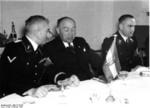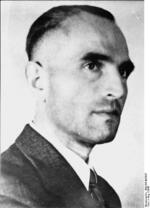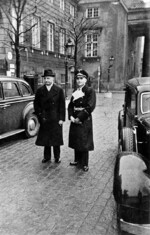Werner Best
| Surname | Best |
| Given Name | Werner |
| Born | 10 Jul 1903 |
| Died | 23 Jun 1989 |
| Country | Germany |
| Category | Government |
| Gender | Male |
Contributor: C. Peter Chen
ww2dbaseWerner Best was born in Darmstadt, Germany. He was a high-ranking official of the SS; before 1939 he was the head of the Reich Security Main Office (RSHA), and between 1939 and 1940 deputy of Reinhard Heydrich. In 1940, he was appointed the civilian administrator in France. In 1942, he became the Reichsbevollmächtigter, Reich's Plenipotentiary, of Denmark. He enjoyed a relatively good working relationship with King Christian X despite the King's image as the symbolic head of the Danish resistance. He remained in Denmark until the end of the war. When the war ended, he was arrested, tried, and sentenced to death by a Danish court for his involvement with the deportation of Danish Jews. He was pardoned and released, however, in 1951. Best died in Mülheim, Germany in 1989.
ww2dbaseSource: Wikipedia.
Last Major Revision: Aug 2006
Photographs
 |  |  |
Werner Best Timeline
| 10 jul 1903 | Werner Best was born. |
| 23 jun 1989 | Werner Best passed away. |
Você gostou deste artigo ou achou este artigo útil? Se sim, considere nos apoiar no Patreon. Qualquer valor já vai ajudar! Obrigado. Por favor, ajude-nos a divulgar o site: Fique atualizado com WW2DB: |
Visitor Submitted Comments
30 Jun 2017 10:01:34 AM
Seems to me like he might have realised what he was doing was wrong.
I think it's a little wrong for the summary not to recognise that before the war was over, this man seemed to have tried to repair some of the evil he had caused.
I don't think it's fair to imply that he had been "pardoned" simply from a "relatively good relationship" with the Danish king - I doubt there was any connection at all.
It can be argued that, being as shrewd as he were in his legal career, his role in minimising the deportation of Danish jews was merely a preemptive measure in an appeal for leniency by Danish courts in the likely eventuality that Germany loses the war and he is captured. He was after all rather farsighted, pragmatic and manipulative with the law; and was certainly in a high enough position to see where the war was headed.
Perhaps it was a genuine case of remorse for his crimes against the Jews. Or perhaps he simply thought of them as nothing more than as a means to be exploited for his protection in the event that he was captured. It might not have mattered to him whether people lived or died, just that saving some Danish Jews would save his own skin. He might have figured that so long as there were sufficient Jews deported, he would be able to appease both sides of the tribunal, whichever side eventually won the war.
Regardless, what matters is what happened: alot of people died because of him. Alot of people avoided certain death because of him, whatever his reasons. I'm doubt any miscarriage of justice happened in the Danish courts, but his sentence reflects the difficulty of assessing the case. On one hand you have the butcher of Paris, but on the other you have uncoerced testimonies from Danish jews during the trial claiming this man personally warned them ahead of jewish deportation and saved their lives - a powerful case for portraying the criminal as having remorse, which would strengthen his defence in court, no doubt, as he would have known also.
But why did he only warn some? The biggest problem with believing in his remorse is that he could have done more, and in not doing so is, to me, seems to demonstrate a casual regard for life. Perhaps, as he knew, he only needed to make enough effort as to have a sufficient number of people to call to stand for his defense in the event of his trial. On the other hand maybe he was genuinely blocked being in such a high profile position and under tight scrutiny, his efforts representing him trying to do all he could discreetly without raising enough alarm to get arrested himself. He had orders to carry out after all, and the inconsistency in his actions is not unusual for any man facing a sort of complex moral conflict.
Personally, I think there's probably at least a degree of motivation by self-interest throughout. But I guess what actually matters is that lives were saved by him. And also that he killed many people. So he was definetely guilty of his crimes, but it might seem justified - for whatever his reasons were - for the Danish court to factor the Danish lives he did save into a reduced sentence. He was never pardoned, according to wiki, he was given the death sentence, then reduced to 5 years, then raised to 12 in by the Suprene court. Just from this you can imagine the layers of trials and lengths in which this man was tried and convicted.
I'm reasonably sure that for such a high profile enemy of the Danish people, literally the very face of the occupation in that nation, the Danish courts would have spared little expense in reviewing his case at length and attempting to be as faultless in the application of law and their sentencing as possible.
If hatred and prejudices for a person is what determined whether he should be executed, well, that'd just be outright hypocritical wouldn't it. It is commendable that the courts preserved their integrity and rule of law despite probably wanting very much to see him hang. Those Danes were pretty sane, considering.
All visitor submitted comments are opinions of those making the submissions and do not reflect views of WW2DB.

- » Wreck of Teruzuki Found (27 jul 2025)
- » USS Orlean's Bow Found (22 jul 2025)
- » The Emperor of Japan Planned to Honor WW2-era Japanese POWs in Mongolia (4 jul 2025)
- » US State Lawmaker John Winter Caught Using Racial Slur "Jap" and Apologized (11 jun 2025)
- » US Government Plans to Purge WW2 Information (17 mar 2025)
- » Ver todas as notícias
- » 1,181 biografias
- » 337 eventos
- » 45,111 entradas na linha do tempo
- » 1,246 navios
- » 350 modelos de aeronaves
- » 207 modelos de veículos
- » 376 modelos de armas
- » 123 documentos históricos
- » 261 instalações
- » 470 eventos
- » 28,473 fotos
- » 365 mapas
Lt. Gen. Lewis B. "Chesty" Puller, at Guadalcanal
Por favor, considere nos apoiar no Patreon. Mesmo R$1 por mês já faz uma grande diferença. Obrigado!
Ou, por favor, nos apoie adquirindo alguns produtos do WW2DB na TeeSpring. Obrigado!
28 Jan 2010 05:46:26 AM
Quite amazing how this vile monster escaped the hangmans rope. Lets not forget that it was he who legalized the Gestapo to unleash a reign of fear and terror across Europe. The dawn arrests (often on the flimsiest of excuses),torture and summary executions can all be placed at the door of Himmler's protege.